Friday, 06 September 2024
I may be biased but I find it easier to spot sustainable fashion boutiques in smaller cities with a university than elsewhere, and Göttingen is no exception.
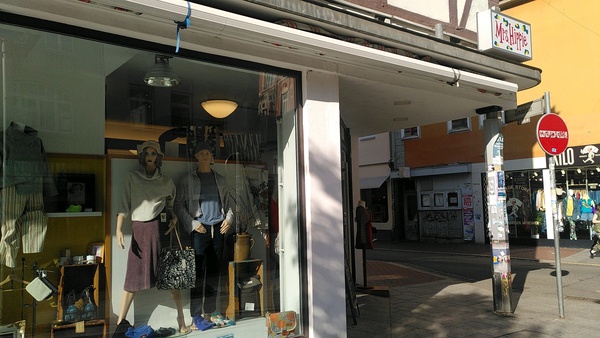
It's the only West-German city with a branch of the colourful
Mrs. Hippie chain (the other branches are in Dresden, Erfurt, Leipzig and Magdeburg). As the name suggests, colourful loose-fitting comfort fashion made from fibres of natural origin dominates the shop. The prices here are moderate, but to be affordable for smaller purses the shop makes compromises: While fabrics made from organic cotton or linen are available, there's also a lot of viscose (usually not made with the eco-friendly lyocell process). Recyclability (which would require mono-materials) is not in the focus (many pieces contain rayon/elastane), but sustainable production, preferably in Europe, definitely is.
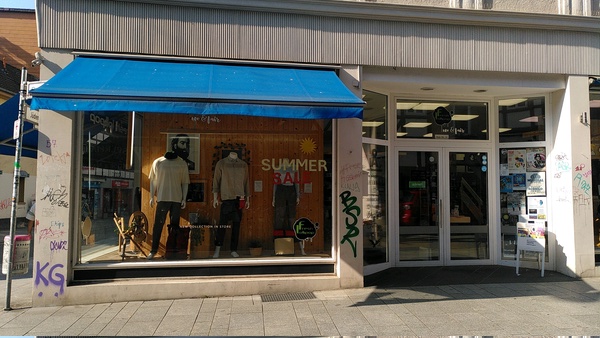
If sustainable brands are important to you, you'll find a lot of both, established and less known brands at
Fresh Lollipop. All pieces here are fairly produced, both, with respect to the working conditions of the growers of natural fibres, the producers of the fabrics and the textile workers. The fabrics are either mono-materials, recycled and/or certified organic, to work into the direction of cradle-to-cradle processes. In the few cases where polymere mono-materials are used in washable textiles, only new PE and nylon is used to minimise microplastics abrasion in the washing machine. Apart from clothes and shoes for all sexes, bags, rucksacks and other accessories are being sold on two floors.
There's a second shop in Kassel.
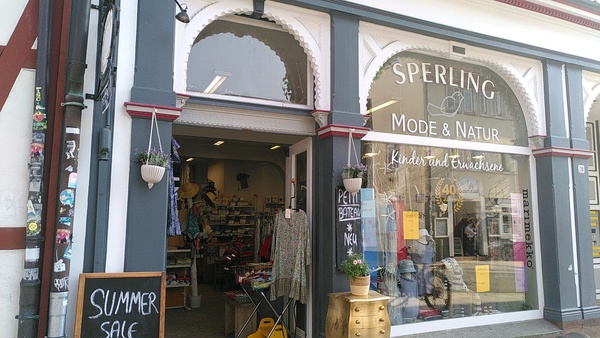
For organic clothes for babies, toddlers and younger children simply cross the street where you find
Sperling Mode & Natur. The crammed, yet cosy shop has a long history: It was established in 1983. It also sells a small selection for women and uni-sex accessories. If you come with smaller kids, there's a small table where they can draw and colour.
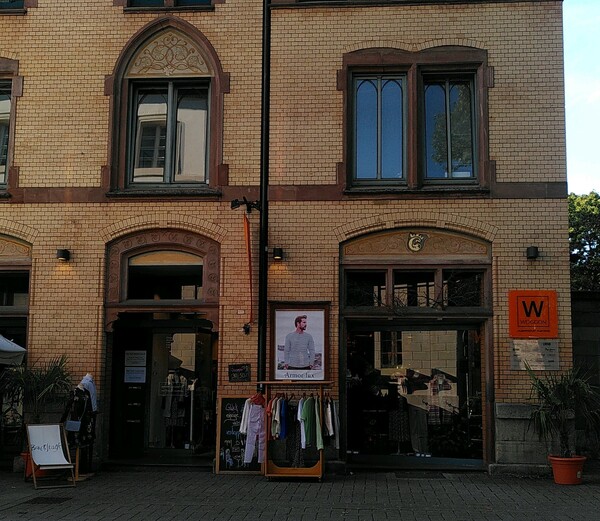
Whether you are generally prefering long-lasting artisanal (and as a consequence more expensive) clothing made from natural materials of highest quality or simply like to spend time in a carefully curated boutique for the distinguished bourgeois, take a break at
Woggon. Clothes, shoes, bags and other accessories are beautifully presented in a wood-and-brick showroom with a beautiful staircase, everything nicely arranged with carefully choosen details: a book here, a typewriter there. The service is impeccable, and as another customer exclaimed: "It's difficult not to buy a nice thing here." The shop also serves as a beautiful venue for concerts and readings.
Long-lasting clothes from natural fibres, often organic and often made from mono-materials can be found at the outlet of the Freiburg-based sustainable web and post order shop Waschbär – at least until October, 31st 2024 when the shop is going to be closed.
Fairly traded accessories and jewellery of beautiful and long lasting quality can also be obtained from the Contigo fair trade boutique.
2024-09-06 22:30:00
[Goettingen, Erfurt, Dresden, Leipzig, Magdeburg, organic, fashion, shoes, fair, shopping, gifts]
[direct link · table of contents]

Thursday, 22 August 2024
Forget about sushi, pizza, pasta, burgers, curries and other globalized commonplaces – in Dresden it's much easier to find hearty home-cooked dishes made from locally sourced ingredients rooted in local and regional food traditions. This does not necessarily mean German – mind you that the borders with Czechia and Poland are close, so many menus reflect influences rather from Eastern than Western or Southern European cuisines.
Many dishes include meat, yes, but all the places I am covering here have a decent selection of tasty vegetarian options readily available.
Old town
A few steps from the Altmarkt, just across Kreuzkirche you'll find Cafe Aha which is covered here. Longer west, facing the modern building of the University of Music in Schützengasse you may be surprised to find a small island of baroque buildings with a wild garden, housing the city's environmental centre, and a great disappointment: The cosy rustic wholefood restaurant on ground flour dubbed Brennnessel ("stinging nettle") once used organic ingredients and still can be found listed as an organic restaurant, but alas! – no more.
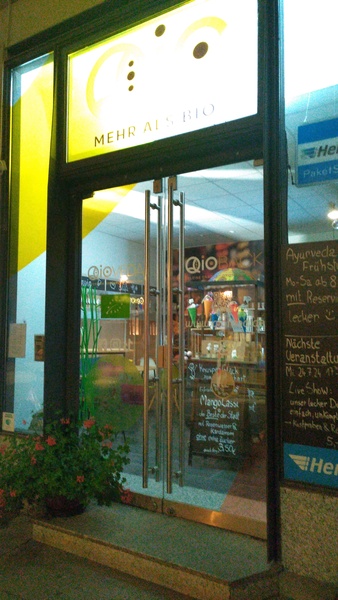
For a filling ayurvedic lunch or snack a few steps from the tram hub Pirnaischer Platz pay a visit to the
Qio bistro, in the vicinity of Cafe Aha. The place is a add-on to a small organic snack bakery – needless to say that you can buy their vegan sweet and savoury crackers made from legumes instead of wheat here alongside with a range of teas and other organic food items. On prior notice they also serve ayurvedic breakfast. So far I haven't had the opportunity to eat (or have a coffee) here, so let me know what you think.

Neustadt
For rustic food and surroundings head for one of the oldest independent pubs in town, the Planwirtschaft ("planned economy") in the Neustadt neighbourhood, popular since its beginnings as an illegal pub in the late GDR. On mezzanine level they serve breakfast, lunch and dinner as well as coffee and cake while the basement houses a pub which opens in the evening. When it comes to their supplies they focus on buying from local farms and enterprises as the (unfortunately not organic) independent butcher's directly across the street or a tea shop next door from which they also source the organic teas on offer. The goat cheese is always organic. They used to have an organic meat dish (which was marked as "bio" on the menu), but unfortunately no longer. My vegan dish of the day (celeriac in a hearty plum-fragranced sause with polenta and green salad) was absolutely tasteful. Have a tasty organic apple cider or beer, and ask about organic ingredients.

Young German kitchen is the promise of the Lila Soße ("purple sauce") gastro bar within the eccentric
Kunsthofpassage with its small boutiques and lovely places. Apart from daily changing main courses (most of them meat or fish, and often with an Italian touch) you can order tasty German "tapas" to your liking – warm, cold and sweet – served in a glass as well as dips and bread. None of the courses are fully organic, but many ingredients are, and chances are high that you can combine cleverly if you ask. They offer organic softdrinks, but no organic alcoholic beverages.
Out of town
If you take the urban train number 2 from the Neustadt train station, either on the way to the airport or to a stroll in the woods of Dresdner Heide, get off Bahnhof Klotzsche (one stop before the airport) and have breakfast, lunch, tea or a snack in its 110 years old railway station. Since the folks of Vorwerk Podemus took over and restored the historical building in 2015 it has been home to a bicycle shop, an artist's studio, an organic supermarket, and the now fully organic station restaurant dubbed Bio-Bahnhofswirtschaft with its pleasant beergarden.
Travellers and ramblers may be glad to hear that they can fetch an organic breakfast or packed lunch on the go, though
unfortunately not on Sundays as the restaurant is closed that day.

The vineyards on the slopes of the river Elbe around Dresden form Europe's smallest, most northern wine region, and fortunately the Saxon state winery of Hoflößnitz in Radebeul turned organic. The small town located west of Dresden on the northern shore of the river is famous for the writer of travel fiction, Karl May and its Museum of North American Indian Culture and can be reached easily, both by urban train, tram no. 4 and bicycle. Follow the Elberadweg cycle route on the southern shore, cross the bridge at Niederwartha and turn back east on the northern shore cycle route through Radebeul until you find signposts pointing to the vineyards on the hill.
The Hoflößnitz winery has a small self-service restaurant, the Hoflößnitzer Weinterasse, with an outdoor seating area shaded by horsechestnut trees from where you have a great view over the grapewines and the valley while tasting the local wines. All wines, but not all the food are organic: Your best choice is the "Winzerplatte" – home-made white bread with pickles, a little salad and a number of spreads of your choice of which the bread and the vegan spreads are organic.
There's also a small museum with information on all Saxon wineries and a wine shop where you can buy their products, mainly white and sparkling wines. Stick to Hoflößnitz for organic ones.
No longer organic
In 2012, when the
Mensa U-Boot ("submarine") on the campus of the Technical University on the campus of the Technical University was opened after major refurbishment work
it was re-opened as a fully organic students' refectory offering
one vegetarian and one omnivore meal at a very competitive price. All food and drinks at that time were certified organic. Unfortunately this is no longer the case in 2022: Given low frequent visits during the Corona pandemic the staff decided to not prolong their organic certification and turn to cheaper ingredients.
Closed
The following places ceased to exist, although you still may find references to them on the web:
-
Lilisou, Louisenstr. 58 (vegetarian, burgers, soups, curries)
- Lingner, Lingnerpl. 1 (German, international)
-
ElectricLotus, Louisenstr. 58 (vegetarian, ayurvedic, Indian)
- Abutheke, Alaunstr. 68a (Middle-Eastern)
- roots, Hauptstr. 35 (vegan fast food)
- Wurzelküche, Alaunstr. 11 (vegan)
2024-08-22 17:00:00
[Dresden, Radebeul, Elbe_cycle_route, Elberadweg, Neustadt, vegan, organic, coffee, lunch, dinner, snacks, restaurant, pub, wine, beergarden]
[direct link · table of contents]

Wednesday, 21 August 2024
If you are familiar with Johann Sebastian Bach's Coffee Cantata from around 1735 you've heard about the Saxonian citoyens' love for coffee and a good piece of cake (if heading for a local speciality, try the Eierschecke cheese-cake). With a pinch of irony people will talk about the famous Saxonian "Bliemschenkaffee" ("(little) flower coffee") referring to the thin coffee or caffeine-free coffee substitute during World War II or in the households of the poor. The term refers to the fact that you could see the flowery ornaments on the ground of the (well, not in all cases) Dresden china coffee cup.
The Saxonian's love for coffee hasn't faded since, they still proudly refer to themselves as "Kaffeesachsen" (coffee Saxonians), and most organic supermarkets will serve you a latte or Italian style coffee, both to have on the spot, and to go (in this case don't forget your refillable cup).
There are however more pleasant places for a chat with friends, some reading or working time with a delicious cup of coffee.
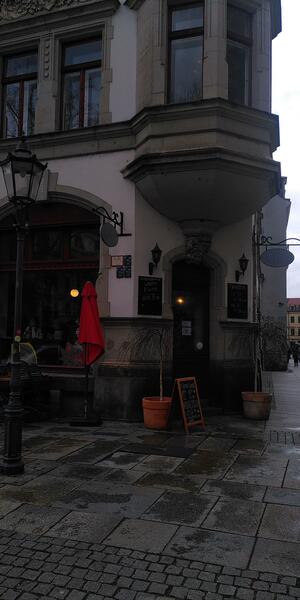
Neustadt
My favourite day cafe for about seven years, with friendly service and a huge display of gorgeous cakes and pastries, Die Kuchenglocke in Wilheminian Neustadt unfortunately closed in summer 2022. Run by the son of
Dresden's first (and to my knowledge only) organic bakers and one of the first organic ice-cream makers in Germany it revived the
tradition of Viennese style coffeehouses in the city. In 2022 he took over the
Heller bakery, and the cafe had to close. In March, 2023 it re-opened as Café Glocke, and apart from the interior decoration, not much has changed: You can still/again have (and buy to take out) cakes and coffee, and have gorgeous fully organic breakfast(all day long) and lunch. When the weather is nice take the chance to sit outside at the beautiful, comparatively quiet square around Martin Luther church.
The price for a (vegetarian) breakfast, sweet with pancakes or a croissant, savoury e.g. with hummus, roasted veges, bulgur and other spreads, is around 20 EUR but since the servings (especially of the savoury types) are quite generous, you may decide to share as long as you're not on your own.
On weekends it is advisable to order a table in advance as the place usually is quite crowded at that time.
The bad news: Effective February 2024 the place stopped accepting cash. Since the Oswaldz cafes have never been accepting payments without data tracking, the number of non-discriminatory organic breakfast and lunch places with a sense for data privacy are alarmingly diminishing in town.
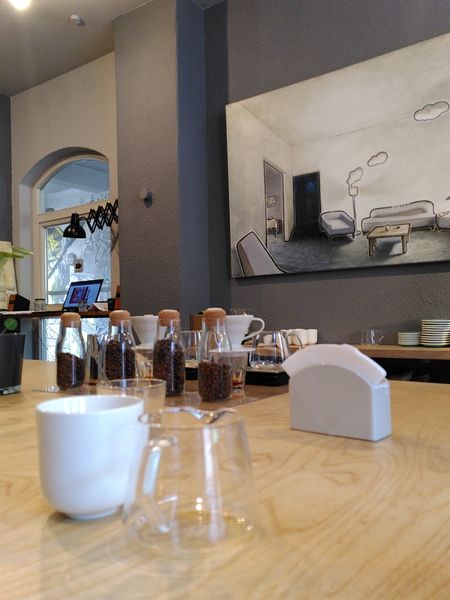
Not far away, on Bautzner Straße, you will find Phoenix Kaffeerösterei, a small-scale coffee roaster cum coffee bar furnished in coffee-coloured wood – ideal for the recreational sip of Italian style coffee. Their coffee is fairly traded, yet not organically certified, although they had organic coffee when they started up in 2006. The milk for a latte or New Zealand style Flat White however is organic. Mind you that their opening hours are quite restricted, usually to Fridays and Saturdays, but they often keep closed on Saturdays, too.
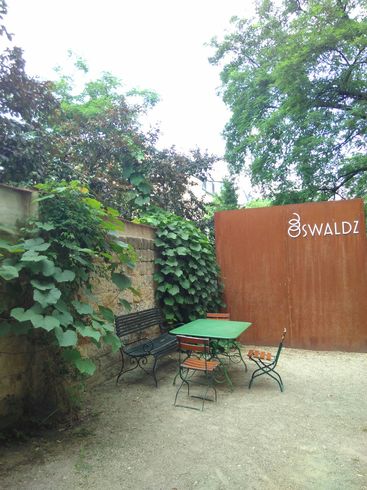
A ten minutes walk west, just before you reach Albert-Platz you can taste the Phoenix coffee all week long at the Oswaldz, a crowded coffee house cum gallery run by an ambitious young team. Before you sit down fetch a service number and put your order at the bar where you can choose from an impressive list of coffee drinks, among others a galao (coffee and milk frozzed together) or a gibraltar (double espresso macchiato). The milk they use is locally sourced and organic. You can also have a sandwich or cake partially made from organic ingredients – eggs and cottage cheese are organic, flour and fruit are not, and since the friendly staff happily answered my questions I'm sure they will equally friendly answer yours. During the warm season they open a pleasant backyard for their guests.
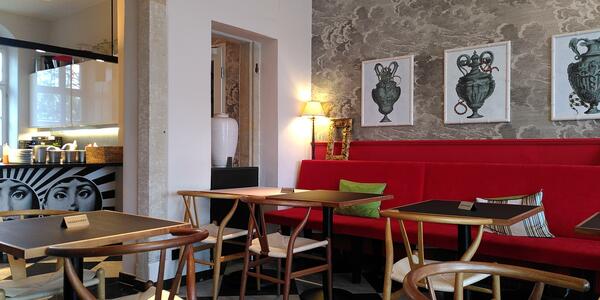
In 2023 Oswaldz rented a second shop next door and turned it into
serviced Oswaldz Breakfast Place.
All food for both, the cafe and the breakfast restaurant are prepared in its open kitchen while the coffee drinks are made by the baristas at the cafe. The menu is the same for both places as is the privacy-unfriendly decision to refuse payments in cash.
During the warm season there's a third Oswaldz place, the
Os2 – Café am Fluss.
Unfortunately there's no organic coffee place inside the Bahnhof Neustadt railway station, but if you have sufficient time you may leave the station building at the rear (Northern) entrance and head for the friendly self-service cafe cum bistro of the VG supermarket Friedensstraße for both, breakfast, lunch (try the hearty Soljanka soup if available), a snack, coffee or travel provisions.
Old town
Facing Kreuzkirche on Altmarkt with its white-washed interior one of the few places where the wounds of the Anglo-American bombing by the end of World War II still are visible you will find one of Dresden's first organically certified eating places, cafe cum restaurant Aha. Some years ago they quite controversely decided not to prolong their certification in support of uncertified local farmers following organic or near-organic principles. More than 75 percent of the ingredients they use are still organically certified but they stopped (probably enforced by law) to make this transparent, so you have to enquire on specific ingredients if you care.
The cafe itself is equally popular among students, families and NGO groups. Its walls frequently serve as a gallery for local artists, and the daily menu often reflects and extends the exhibitions. The list of coffee drinks is long, ranging from oriental and Indian inspired spiced coffee to the ubiquitous espresso.
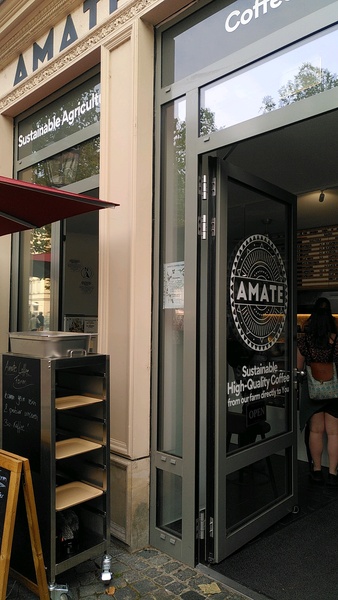
The cakes are delivered by the Heller family, but you can also enjoy hearty home-made meals throughout the day (til late), or simply help yourself at the salad bar located under the stairs. Breakfast is being served from 9 am. In the basement there's a well assorted
fair-trade shop
which cannot follow the restaurant's liberal opening hours and is closed in the evenings and on Sundays.
In the maze of tourist restaurants around the Neumarkt place with iconic Frauenkirche you'll find
Amate Coffee Farm, an inviting coffee place with pleasant outdoor seating serving organic coffee drinks made from directly and fairly traded Mexican coffee. The menu also offers organic softdrinks, but as my time here was very brief I couldn't ask the staff whether the cake was organic, too.
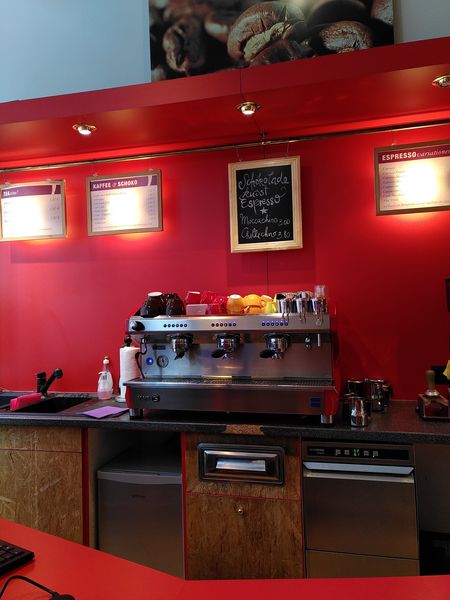
If you have to spent time in the vicinity of Dresden's central train station, Hauptbahnhof, pay a visit to another fair-trade shop, the Contigo at the Southern end of Prager Straße. Inside the shop there's an organic coffee bar, perfectly suited for the quick espresso in between, or while you're shopping for gifts, fairly traded artisanal work like bags and jewellery, tea, chocolates or coffee. They do not serve food, so you shouldn't come hungry. If you prefer an unconventional coffee drink opt a coffee based lemonade dubbed "Selosoda".
When the Contigo store is closed ignore the Starbucks branch at Wiener Platz and turn
instead to the
Haferkater porridge cafe facing it. The Berlin-based franchise concept can be found in several German main train stations by now, and the one in Dresden is open on weekends and generally until 8pm. While all prepackaged Haferkater products are organic no promise is made when it comes to the fresh food and drinks, so you'd better ask. Also, ask for returnable cups and bowls if you don't bring your own.
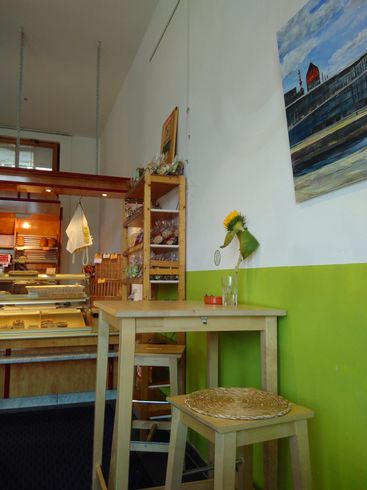
Dresden-Mitte
Not far from Bahnhof Mitte train station and the College of Music the organic co-operative VG runs a self-service Bistro & Backladen – the bistro to the left, the cafe to the right of the entrance. While the lunch is prepared in the open kitchen of the bistro right at the spot, the bakery shop simply sells the cakes (and bread) from local organic bakeries both, to take away and to eat right here in the pleasantly decorated shop room prided with pictures of local artists. Unfortunately the coffee comes from a smale-scale automatic machine – no real enjoyment, but drinkable due to the good ingredients.
While the bistro closes at 7pm on weekdays the cafe operates until 8 pm, but choice will be limited the later you'll come.
Near the Blaues Wunder bridge
A visit to the finest bridge in town, the Blaues Wunder ("blue wonder") steel construction can easily be combined with a visit to the arguably finest Viennese-style coffee house in town, the Café Toscana. Observing the bridge and the river you can sit in the winter garden having an organic coffee drink or tea. Your organic latte will be poured together at your table. While a selection of soft drinks and wines, the milk and breakfast eggs are all organic none of the gorgeously looking cakes and confectionery to be ordered from the sales desk are, at least not fully (enquire about what's tempting you). The history of the coffee house named after a Saxon princess customer dates back to the end of the 19th century. Since its re-privatisation after Germany's re-unification it has been run by the Eisold family, a local baker's family now in its third generation.
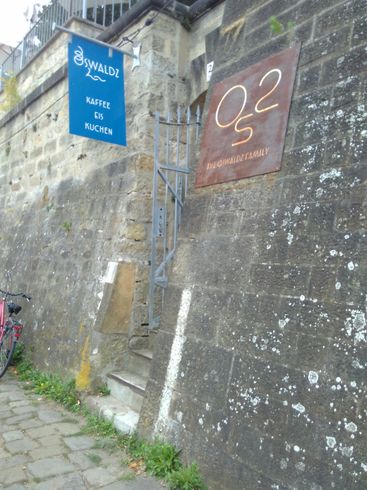 Crossing the blue wonder bridge you'll reach Körnerplatz, and if you fancy a stroll along the river shore, turn left into historical Körnerweg which leads you towards the city centre along the embankment. A 15 minutes walk on the way you'll find Os2 – Café am Fluss, a summer cafe run by the Oswaldz owners serving coffee drinks with organic milk, organic soft drinks and cakes to passers-by on weekends during the nice season. Most seats are located outside providing a beautiful view over the river and the city's silhouette. As at Oswaldz order at the bar inside, find yourself a seat, wait to be served and pay before you leave. The bar room also serves as an art gallery.
Crossing the blue wonder bridge you'll reach Körnerplatz, and if you fancy a stroll along the river shore, turn left into historical Körnerweg which leads you towards the city centre along the embankment. A 15 minutes walk on the way you'll find Os2 – Café am Fluss, a summer cafe run by the Oswaldz owners serving coffee drinks with organic milk, organic soft drinks and cakes to passers-by on weekends during the nice season. Most seats are located outside providing a beautiful view over the river and the city's silhouette. As at Oswaldz order at the bar inside, find yourself a seat, wait to be served and pay before you leave. The bar room also serves as an art gallery.
Leubnitz
If you ever happen to strand somewhere between the tower blocks of Prohlis and the Technical University, take the time to visit the city's only organic bakery and confectionery, the Bio-Bäckerei und -Konditorei Heller mentioned afore – if only to have a wonderful ice-cream on the go. When the weather is nice they also have a small outdoor terrace for you to have a coffee and cake or snack.
Although the bakery is open on Sunday mornings it's closed on public holidays.
Closed or no longer offering organic options
The following places ceased to exist, although you still may find references to them on the web:
2024-08-21 20:00:00
[Dresden, Neustadt, organic, coffee, breakfast, lunch, snacks, fair, cafe, ice-cream, restaurant, confectioners]
[direct link · table of contents]

Dresden's Wilhelminian neighbourhood of Neustadt is dominated by independent shops and venues, many of them run by female entrepreneurs as documented by an art project of local photographer Christine Starke. So it comes as little surprise that it is here where you have the best chance to discover a lot of gems, driven in accordance with the personal principles of the shop keeper which often include social and environmental aspects. Keep your eyes open, and you will discover a lot more than I have to suggest here.

Herbalists and beauty
The old town does not have much to offer in terms of independent and surprising shops, and the Altmarkt-Galerie mall is as boring as these shopping centres usually are. A notable exception is the Sonnentor shop directly located at the mall's entrance at Postplatz, next to the tram-stop at Wallstraße. Franchises of this Austrian producer of organic and fairly traded herbs, teas, condiments, bodycare products and spices are usually located in malls or main shopping areas, neatly designed heavens offering products that are good for both, you, and the farmers and producers involved when you're in the mood for shopping.
If you're on the outlook for herbs, remedies, bodycare and food items based on ingredients described by medieval healer nun Hildegard of Bingen pay a visit to the Marone herbalist shop on Bautzner Landstraße directly located at the east-bound tram stop Pulsnitzer Straße. Not all of the products on sale (which among others include chestnut products and a small selection of biodynamic wine) in this small specialist shop are certified organic though.

Leaving the tram tracks and entering the more pedestrian-friendly quartier natural and organic bodycare products can be found at the
Touch of Nature beauty parlour cum shop in Böhmische Straße east of Rothenburger Straße. Note that this shop is
closed on weekends.
Bicycles
A few steps from Touch of Nature there's a second hand bicycle shop cum workshop, Zwout! (formerly Elbcycles), where you can buy a used or recycled bike if you're staying longer, or get your own one fixed.

Jewellery
If you follow Böhmische Straße until it ends at Alaunstraße. A
luminous blue wall indicates the location of the Geldschneider & Co. steam-punk workshop. Among others you will find beautiful jewellery made from recycled parts of abandoned analog wrist watches. The place has somewhat erratic opening hours, so step by when nearby (if you need to plan ahead: Saturdays seem a safe bet). If closed during regular German shop opening hours you may call the phone number given on the entrance door – except during the Tollwood festival in Munich where the Geldschneider usually runs a booth.
Fair trade
As in many other German cities the first address for colourful gifts as well as organic sweets, spices and condiments are fair-trade shops founded as grassroots activities by Christian parish members in accordance with the conciliar process of mutual commitment (covenant) to justice, peace and the integrity of creation (JPIC). As the host for pioneering regional ecumenical plenums in 1989 and 1990 the city of Dresden has been playing an important role in this process. The spirit of this movement lives on in local fair trade initiatives like Quilombo which for almost 25 years had run a fair-trade shop in the entrance area of Dreikönigskirche in Hauptstraße which played host to the first democratically elected local parliament in Saxony after East Germany's peaceful implosion in 1989. Today the initiative still has a shop in the neighbourhood of Löbtau while their former place in the "Haus der Kirche" ("house of the church") has been converted into fair-trade
Cafe Dreikönig.
Sharing their roots with the Quilombo NGO the team of
Cafe Aha opposite Kreuzkirche runs a fair-trade shop in the heart of the city. It is located in the basement of the cafe and offers an impressive selection of fairly-traded gifts, body care and dry goods. This initiative also runs a fair-trade ...

Fashion
... boutique, Aha Naturtextilien, on Hauptstraße, offering a great selection of fairly traded fashion made from natural materials. Here you will also find a good selection of stationary, jewellery, eatable fair-trade goods and more. By the way: the name "Aha" is an abbreviation for "trade/act differently" ("anders handeln" in German), and implies a huge effort in not only selling fairly traded goods but offering fair conditions to their own employees.
Another centrally located fair-trade shop specializing in fashion and household accessories as well as coffee and chocolates is Contigo near the central train station.
For more ethically produced and sustainable cocooning items visit Tranquillo, a likewise colourful fashion-and-things boutique cum fashion label in the Neustadt neighbourhood, at the crossroad Louisenstraße/Rothenburger Straße. They produce their own women fashion entirely made from organic textiles focussing on basic colours – if you like Aha Naturtextilien don't miss this one. There's also a sustainable furniture outlet cum cafe on the other side of the train tracks to Neustadt trainstation.
If you like loose-fitting clothes, either unicolour or with colourful patterns head to the Dresden branch of
Mrs. Hippie. Their own brand is made in Poland, and all clothes are predominantly made from natural fibers, often organically certified, or rayon/viscose. However, they are not necessarily free of elastane.
Dresden's first fashion boutique exclusively selling fairly produced clothing from fairly traded, organically grown materials is dubbed
Populi and
can be found at the Western end of Louisenstraße, just before you reach the tram tracks of Königsbrücker Landstraße.
Both, streetware, denim and designer labels can be found here, for men and women. The interior of the shop is to a great deal made from upcycled furniture.
Students and nerds find fairly traded organic cotton t-shirts and sweaters with unique scientific prints at Unipolar, and everyone else organic streetware for both, men and women. This small, Dresden-based fashion label is the brain-child of a former physics student. The original store between the Bahnhof Mitte train station and the "Carl Maria von Weber" College of Music does no longer exist. (But if you already are here: the VG warehouse next to this old location has a well-assorted organic fashion section upstairs.)

As of 2024 Unipolar consists of two shops on both sides of Rothenburger Straße in the Neustadt neighbourhood, one selling clothing, and the other shoes and sustainable household gear. Finding the shops is easy: Simply spot the bath tub opposite the tram stop.
More colourful organic streetware, less nerdy prints, and open late on Fridays and Saturdays – that's
El Dorado Street Fair in Alaunstraße.

Before the arrival of noisy and cheap looking street food shops this street, the entrance to the Neustadt neighbourhood, was populated by numerous owner-run, carefully curated fashion boutiques and second-hand shops catering for a diverse crowd. Some of them have been surviving, and I'm more than happy that this shop venue, after the closing of El Dorado's predecessor, Invito, remained an organic fashion boutique.
Babies and toddlers
If you are on the look-out for beautiful, not overly sweet organic fashion for toddlers and smaller children or simply for beautiful organic garments step by Elvida in Louisenstraße approximately opposite Planwirtschaft pub and cafe. There you'll find the small flagship store of a Dresden-based sustainable kids fashion label – and a source for organic sewing things.
The following places shut down, so don't be mislead when you find references to them on the web:
- Quilombo, Haus der Kirche, Hauptstr. 23 (fair-trade)
- Baum&Wolle, Alaunstr. 13c (fashion)
- Ex Animo, Martin-Luther-Str. 17 (fashion and things)
- Hüpenthal Boutique, Bautzner Str. 63 (bespoke tailor, I miss your beautiful collars, r.i.p., Herr Hüpenthal!)
- Invito, Alaunstr. 20 (fashion, suceeded by El Dorado Street Fair)
- Lipfeins Lieblinge, Rothenburger Str. 1 (organic lipcare, factory outlet – their products can of course be obtained online or (e.g.) from one of the VG supermarkets)
- LouisdoOr, Louisenstr. 4 (sustainable toys and baby clothing)
- Tranquillo Outlet,
Louisenstr. 45 (organic fashion, visit them here)
- Unipolar Mitte, Jahnstr. 1
(streetware, visit them here)
- Un-Kraut, Martin-Luther-Pl. 12 (herbs and spices)
2024-08-21 17:30:00
[Dresden, Neustadt, shopping, organic, fair, fashion, shoes, spices, tea, herbs, delicatessen, gifts, upcycling, steampunk, bodycare, furniture, household, children, toys]
[direct link · table of contents]

Wednesday, 21 February 2024
If you are looking for pioneers in the German zero waste movement you'll find one of them in Dresden's Neustadt neighbourhood:
Bring a selection of glasses, containers and bags and stop by Lose ("loose-weight"), a cosy zero-waste corner store in Böhmische Straße. Unlike other package-free supermarkets this one does not only sell dry food, natural body care and household chemicals but also offers veges and has a cheese counter. Although most of the products are organic some are not, so you might want to check the labels on the suspenders for the bio keyword or ask.

The interior of the shop was refurbished and is now much lighter and seems spacier than before. The reason for this is that the coffee corner which had been there before the corona pandemic has decreased and the serviced counter for bakery products, cheeses, antipasti and coffee moved from the entrance area to the backpart of the shop. Mind you: like other package-free shops Lose does not have an illuminated window front, so be brave to try the door handle – the place may look quite dark even when open.
Supermarkets with zero-waste stations
Moreover all shops of the co-operatively organised local wholesale chain VG Biomarkt offer a good selection of loose-weight organic dry goods (in addition to an abundance of often locally produced fruit and veges and dairy products and drinks of all kinds in returnable glass bottles).

Their main shop is located near
Bahnhof Mitte train station, an entire organic warehouse on the premises of a former newspaper printing plant. Standing back from the main street the first floor is occupied by an organic convenience store supporting your zero-waste efforts. On the second floor there's a well assorted organic fashion store mainly for babies, children and women, with a section offering organic body care, household chemicals, sustainably produced toys, stationary and more.
For members prices are lower, but the shop is open to everyone.
On weekdays the self-service bistro directly facing the street offers delicious lunch (only snacks on Saturdays), and there's a cafe cum bakery shop featuring young local artists.

VG Biomarkt also has branches in the neighbourhoods of Neustadt (Hechtviertel), Striesen, Johannstadt, Strehlen, and Loschwitz,
Mind you that the one in Striesen, at Polandplatz isn't easy to find: Opposite the triangular park there's a driveway which one can easily miss as no sign at the entrance points to the shop. Be brave an move past, you'll find the shoü at the right hand site.
If you want to return empties, find the appropriate crate in the entrance area, pin down its code, tell the cashier and put the glass or bottle at the appropriate place.
The Loschwitz branch dubbed VG Balsamico is conveniently located
opposite the downhill station of the cable-run suspension railway ("Schwebebahn") next to
Körnerplatz at the northern end of Blaues Wunder ("blue wonder") bridge.
Opening hours and assortment (of loose-weight products as of products in returnable glasses) vary depending on the size of the market and the neighbourhood. However, all VG markets offer free drinking water refill stations and you can book cargo bikes to transport your purchase home free of charge.
While many organic groceries were closing, the Verbrauchergemeinschaft opened a new large supermarket with attached self-service restaurant cum cafe in 2023: The
VG Friedensstraße offers and abundance of loose weight and unpackaged products. Want to shop products grown or made in the vicinity? Watch out for the green "RP" ("regional partner") logo.
While these local groceries were early adopters a number of nation-wide operating organic supermarket chains have been following. In Dresden the two remaining branches of the Berlin-based supermarket chain Bio Company introduced dry food suspenders for use with your own jars.

In 2021 the Denns Biomarkt was the first branch of this chain where I found a dedicated shelf with fairly traded dry food in retour glasses and a few gravity bins with nuts, seeds, rice and noodles. A start at least, although I have my doubts that this small selection will be sufficient to nudge people towards the extra effort it takes to bring along glasses and jars.
Without offering gravity bins the Vorwerk Podemus farm supermarkets supports package-free efforts, too: Hand over your own clean boxes and bags when buying meat and meat products, cheese, bread, rolls or cake from the services counter, and prefer returnable glass bottles and glasses when choosing jogurt, honey and jams.
Farmshops and factory outlets

When you take the Elberadweg bicycle route on the southern shore in direction Niederwartha you'll pass a nice old farmyard, the organic Bauernhof Franz in Niedergohlis. It runs a subscription scheme – phone in or e-mail your order until Wednesday and collect it from the farmshop on Fridays and Saturdays, but if you happen to step by on one of these days and there's someone around you may be able to buy vegetable oil and perhaps also potatoes or other produce from the farm. But of course, shopping their farm products from one of the VG supermarkets might be easier.
In 2022 Vegannett, a Weißer Hirsch-based producer of vegan spreads, started filling products in standardized returnable deposit glasses which
you can buy directly from the manufacturer on Wednesdays.

More to try
For more vegan alternatives to cheese, meat and sausages head for
Die vegane Fleischerei in the Neustadt. January, 2023 a vegan "butcher shop" opened here, and they assured me that all of their products are made from predominantly organic ingredients.
They also offer ready-made "meat" salads and soups, and I'm looking forward to visit the shop in person. Don't forget to take boxes and jars with you.
Closed
2024-02-21 04:00:00
[Dresden, Neustadt, organic, coffee, vegan, zero_waste, unverpackt, cafe, grocery, market, supermarkets, bodycare, household, hemp]
[direct link · table of contents]

















 Crossing the blue wonder bridge you'll reach Körnerplatz, and if you fancy a stroll along the river shore, turn left into historical Körnerweg which leads you towards the city centre along the embankment. A 15 minutes walk on the way you'll find
Crossing the blue wonder bridge you'll reach Körnerplatz, and if you fancy a stroll along the river shore, turn left into historical Körnerweg which leads you towards the city centre along the embankment. A 15 minutes walk on the way you'll find 










